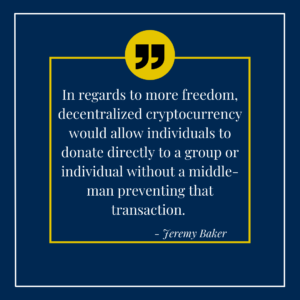[et_pb_section fb_built=”1″ admin_label=”Section” _builder_version=”4.9.3″ _module_preset=”default” custom_padding=”0px||0px||true|” global_colors_info=”{}”][et_pb_row column_structure=”1_2,1_2″ _builder_version=”4.14.9″ _module_preset=”default” min_height=”372px” global_colors_info=”{}”][et_pb_column type=”1_2″ _builder_version=”4.14.9″ _module_preset=”default” global_colors_info=”{}”][et_pb_text _builder_version=”4.14.9″ _module_preset=”default” inline_fonts=”Allerta,Arsenal,Averia Serif Libre” global_colors_info=”{}”]
[/et_pb_text][/et_pb_column][et_pb_column type=”1_2″ _builder_version=”4.14.9″ _module_preset=”default” global_colors_info=”{}”][et_pb_text _builder_version=”4.14.9″ _module_preset=”default” global_colors_info=”{}”]
As with anyone concerned with liberty, cryptocurrency typically comes up in discussions regarding decentralization and freedom, but does it promote such?
Let’s take a deep dive with Jeremy Baker into cryptocurrency to see.
[/et_pb_text][/et_pb_column][/et_pb_row][et_pb_row _builder_version=”4.14.9″ _module_preset=”default” min_height=”2206.5px” custom_margin=”0px||0px||false|false” custom_padding=”0px||0px||false|false” global_colors_info=”{}”][et_pb_column type=”4_4″ _builder_version=”4.9.3″ _module_preset=”default” global_colors_info=”{}”][et_pb_text _builder_version=”4.14.9″ _module_preset=”default” global_colors_info=”{}”]
The idea behind cryptocurrency is to have a secure method to transfer value while also having the creation of new coins regulated by an algorithm rather than an entity like the Federal Reserve Bank or the US Treasury. The two major coins, Bitcoin and Ethereum, use a method of coin creation called ‘mining’. ‘Mining’ comes in various forms, Bitcoin and Ethereum utilize Proof-of-Work mining in order for individuals to obtain new coins. The PoW method of mining has come under criticism because of the amount of power used by ‘miners’, so Ethereum’s mining method is planned to transition to Proof-of-Stake from Proof-of-Work. In Proof-of-Stake ‘mining’, new coins are given to those who stake their currency and each Proof-of-Stake cryptocurrency varies on the minimum threshold allowed to stake. Ethereum’s current proposed minimum staking threshold is 32 Ethereum. Those two mining methods aren’t the only two that exist, there are a few other cryptocurrencies that have uncommon coin creation methods, one example being Pi. Pi cryptocurrency is mined or generated over time by users and contributors are rewarded higher than non-contributors.
[/et_pb_text][et_pb_image src=”https://people4liberty.org/wp-content/uploads/2022/03/crypto-1.jpg” title_text=”crypto” _builder_version=”4.14.8″ _module_preset=”default” global_colors_info=”{}”][/et_pb_image][et_pb_text _builder_version=”4.14.9″ _module_preset=”default” global_colors_info=”{}”]
Now, how does that apply to decentralization? When it comes to a currency, decentralization requires that many people can create coins rather than a central organization. Proof-of-Work and Proof-of-Stake cryptocurrencies take a large investment to get started, but alternatives mining methods such as Pi are better at equally including everyone in mining. The next step is ensuring the network is not reliant on a central server. Distributed validation and consensus among validators on changes to the blockchain not only help with decentralization, but they also add security and integrity to the blockchain.
Decentralization goes further than that, not only do we need a decentralized currency, we need many of them to compete for the best form. Being reliant on a single coin and centralizing society to one blockchain is neglecting the ability to further decentralize. Altcoins should be explored, invested in, and utilized, but very carefully. Some altcoins gain popularity and then implode in a ‘pump and dump’. It’s a phrase all too common among cryptocurrency enthusiasts because it happens frequently. A great example that left investors and the community shocked is the ‘squid game’ cryptocurrency. Instead of a pump and dump where investors buy in early, hype the coin, then sell, the creators of the currency conducted a ‘rug pull’ and flooded the market with coins to make the cryptocurrency value drop to $0 and has now been called a scam.
[/et_pb_text][et_pb_text _builder_version=”4.14.9″ _module_preset=”default” global_colors_info=”{}”]
Another thing to note, decentralization only works when each individual has their own cold wallet. The huge interest in cryptocurrency has pushed more entities to jump in as cryptocurrency brokers and some limit the ability to transfer out of their system to a cold wallet. Some brokers have started their own programs to entice people to keep their cryptocurrency in the hot wallet, like crypto.com’s crypto earn. The problem with this is crypto investors are now centralizing their coins with a broker and a hot wallet. That trust in a central entity should be approached very warily. Crypto.com just recently had a hack that lost $34 million of cryptocurrency from 483 customer accounts according to the market value January 20th, 2022. The most notorious hack was in 2014 with Mt. Gox where 850,000 bitcoin was lost or stolen amounting to about $450 million at that time.
Now on to freedom, cryptocurrency’s biggest appeal initially was the lack of ID associated with the crypto wallets and the ability to transfer coins anonymously. With the big push of brokers and regulated entities getting involved with coins, that anonymity is becoming smaller, if not nonexistent. Some cryptocurrencies have pushed back on the ID requirements, such as Monero. Even with the ID requirements, cryptocurrencies allow a seamless method for individuals to transfer coins to other individuals anywhere in the world that has internet access. The ability to conduct transactions internationally without an exchange is certainly a freedom to note.
[/et_pb_text][et_pb_text _builder_version=”4.14.9″ _module_preset=”default” custom_padding=”||0px|||” global_colors_info=”{}”]
 Recently, donations towards a GoFundMe to the truckers and farmers protesting in Canada
Recently, donations towards a GoFundMe to the truckers and farmers protesting in Canada
were slated to be redistributed to charities that GoFundMe picked, but they have since changed
their mind and decided to refund those who donated. In regards to more freedom, decentralized
cryptocurrency would allow individuals to donate directly to a group or individual without a
middle-man preventing that transaction.
In theory, all of that is great but it doesn’t matter if people do not participate in or adopt the use
of cryptocurrency. Ethair Market wants to make that a possibility by providing an online
marketplace to handle purchases with cryptocurrency. As the adoption and use of
cryptocurrency increases, it comes closer to becoming the world’s reserve currency and more
stable.
[/et_pb_text][et_pb_text _builder_version=”4.14.9″ _module_preset=”default” global_colors_info=”{}”]
We currently value crypto according to government-backed currencies instead of goods. To be a strong independent currency and to take the next step, the value of cryptocurrency needs to be tied to goods. Only at that point will we have the decentralization and freedom we all desire.
[/et_pb_text][/et_pb_column][/et_pb_row][/et_pb_section][et_pb_section fb_built=”1″ _builder_version=”3.22″ global_colors_info=”{}”][et_pb_row _builder_version=”3.25″ background_size=”initial” background_position=”top_left” background_repeat=”repeat” custom_margin=”-120px|auto||auto||” custom_padding=”54px|||||” global_colors_info=”{}”][et_pb_column type=”4_4″ _builder_version=”3.25″ custom_padding=”|||” global_colors_info=”{}” custom_padding__hover=”|||”][et_pb_text _builder_version=”4.10.7″ background_size=”initial” background_position=”top_left” background_repeat=”repeat” global_colors_info=”{}”][/et_pb_text][/et_pb_column][/et_pb_row][et_pb_row _builder_version=”4.10.7″ _module_preset=”default” global_colors_info=”{}”][et_pb_column type=”4_4″ _builder_version=”4.9.4″ _module_preset=”default” global_colors_info=”{}”][et_pb_text _builder_version=”4.10.7″ _module_preset=”default” min_height=”80.4px” global_colors_info=”{}”]
At People for Liberty, we believe in #PeopleB4Politics and through education, advocacy, and opportunities for action, we are working to create and sustain a community dedicated to this end – the end of politics as we know it today. To keep up with our efforts and find a way to become a part of the movement, we hope you’ll subscribe to our newsletter.
[/et_pb_text][et_pb_code _builder_version=”4.10.7″ _module_preset=”default” custom_margin=”-103px|||||” custom_padding=”55px|||||” global_colors_info=”{}”][gravityform id=”2″ title=”false” description=”false” ajax=”true” tabindex=”49″ field_values=”check=First Choice,Second Choice”][/et_pb_code][et_pb_comments _builder_version=”4.10.7″ _module_preset=”default” global_colors_info=”{}”][/et_pb_comments][/et_pb_column][/et_pb_row][/et_pb_section]

